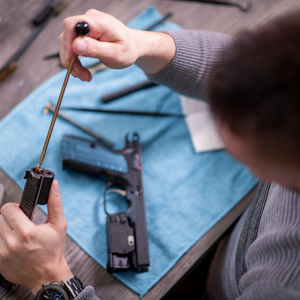Purchasing a gun is a big investment. A quality firearm doesn’t come cheap and typically has delicate internal workings that are critical to proper performance. If your gun gets rusty, you risk compromising the gun's performance.
Properly cared for, your firearm can last a lifetime and beyond. Regular cleaning and maintenance will keep your gun in proper working order for years to come. An essential component to firearm maintenance is rust prevention. Nothing will ruin a gun faster or more thoroughly than rust.
Rust can occur on any metal surface, but it's especially common on firearms that are stored in or exposed to humid or wet conditions. Rust can cause serious damage to your gun, making it difficult to operate and potentially unsafe.
More than diminishing the aesthetic value of the gun, rust can affect the firing mechanics and prevent proper functioning. A gun that has rusted internally may not load or eject rounds properly or become otherwise compromised. A rusted chamber or barrel could even cause your gun to explode.
Any gun that has been exposed to moisture is susceptible to rust. Using a firearm in snow, rain, humid conditions, or even an accidental drop in water can be devastating if not properly attended to. Even if moisture isn’t detectable, using your firearm in extreme cold, or firing corrosive ammunition out of your gun can cause rust. It is critical that you thoroughly dry your gun before the moisture has the chance to oxidize your investment.
Keep in mind that preventing gun rust is always easier than removing rust from a rusty gun. Storing your firearm in a BONE-DRI gun case is the easiest way to prevent rust. BONE-DRI cases utilize moisture-wicking nylon and are engineered with Absorbits technology. BONE-DRI cases absorb any moisture hidden within the most complex parts of your firearm, effectively preventing rust. It’s as easy as putting your gun in the case.
What if my gun already has rust on it?
Preventing gun rust should always be your primary focus, but if your gun does have some rust on it you can use steel wool and gun oil to remove it. Being mindful of firearm safety, ensure the gun is unloaded and the safety is on. Take the gun apart if necessary. Apply gun oil to any rusty areas of the gun. Gun oil helps to break down rust without damaging the surface or finish of your tool. Work the oil thoroughly - anything worth doing is worth doing well.
Use fine, ultra-fine steel wool or an abrasive brush to remove rust by scrubbing the rusty spots off the gun. Steel wool is softer than the metal composing the firearm, but abrasive enough to remove rust. If your gun has a finish, be sure to select a brushing tool that won’t take the finish off. Scrub hard enough to remove the rust, but soft enough that you don’t damage the surface of your firearm.
Keep in mind that most modern firearms have undergone some kind of bluing process. Bluing is the process of treating metal or steel with a black-blue protective coating. The black oxide coating partially protects the gun metal from rusting - it does not fully protect your gun from rust. Blueing also adds aesthetic value to a gun by giving it the sleek, dark appearance. As you’re removing rust from your firearm, keep in mind that you may also be removing the guns bluing. This is another reason why rust prevention will always trump rust removal.
If your gun is fully rusted or your gun is rusty beyond recognition, you might consider sending it to a restoration expert. Gun restorers are specially trained to remove rust and restore a gun to its prime state. It’s their craft. Especially if your gun is an heirloom piece, consider entrusting it to someone who knows what they’re doing.
Although a BONE-DRI case is the best choice for absorbing moisture and preventing rust after elemental exposure, you will still need to clean your gun. How frequently and how soon after use you will need to clean your gun will depend on the type of firearm you selected. A hunting rifle may only need to be cleaned before and after each season (at the very least) whereas a gun you take to the range with you every weekend should be cleaned after each session.
A BONE-DRI case will protect your gun from corrosion by moisture, but if you fire ammunition that leaves salty residue, your gun is at risk of rusting from the chemical reaction of the salt and air inside your firearm. Ammo used in historical firearms and army surplus ammunition are two common culprits that can leave your gun vulnerable after shooting.
Fouling can also cause rust inside your gun. After several uses (or less) gas, powder, oil, and even metal can build up in your gun. This build up of residue is called fouling. Left alone, the residue build up in your gun can corrode and ultimately rust the delicate internal workings of your gun.
Bullet-fouling can also occur when shooting a softer metal round down a harder metal barrel at a high speed. The metal (copper, lead, etc.) is lightly stripped as it is forced through the barrel of the gun. This can coat the inside of your gun’s barrel and reduce accuracy and gun efficiency.
In other words, clean your guns regularly. Oftentimes, you won’t notice corrosion until your gun performance is off and it’s too late. Prevention through maintenance is always easier than trying to save your gun from corrosion.

